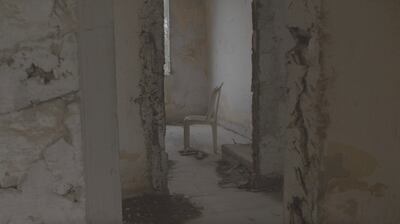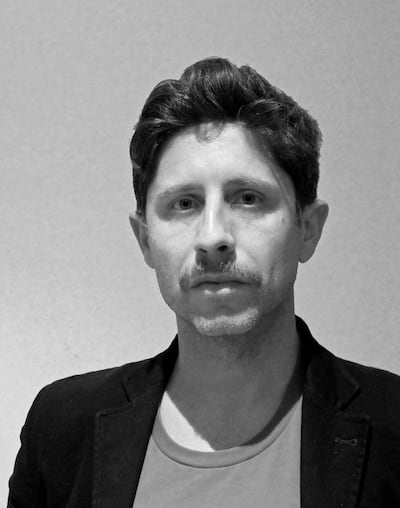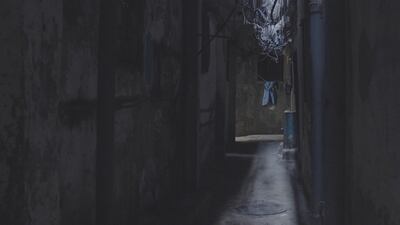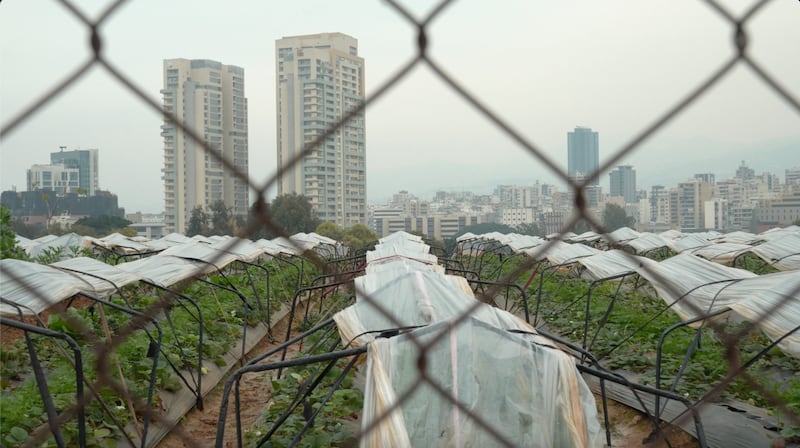Italian filmmaker Daniele Rugo’s latest documentary The Soil and the Sea focuses on the horrific, forced disappearances of more than 15,000 victims of the Lebanese Civil War between 1975 and 1990. It is an important but unsettling film that remains compelling from start to finish.
The taut visual aesthetics work in tandem with voice-overs of the 15-year long civil war’s victims, witnesses and family members who ache to know the fate loved ones in an aptly discordant manner that embodies the film’s subject matter. Rugo says he was influenced by “aftermath photography” and the work of Paul Seawright and Simon Norfolk.
“Nothing needed to jump out, nothing needed to be emphasised too much – everything had to be quite subdued,” Rugo tells The National. “The attempt was to provide a beautiful composition but there should be no main subject in the picture because only in this way could we really get the audience to accept such a relentless unfolding of atrocities and loss.”

Unlike the typical documentary format, in which sound and the visuals work in tandem to affirm or reinforce what is being presented, The Soil and the Sea jars that expectation with powerful effect. We see no faces in the film while voices speak over long, near static shots that reference mundane-looking locations – a university building, Beirut’s waterfront from the sea, patches of vegetables, a monastery, the inside of a derelict warehouse – each an unassuming location that has witnessed torture and massacres, or marks the spot of one of more than 100 unmarked graves.
This format effectively evokes the disconcerting sense of absence, of loss and the vacuum in which life has been forced to continue without closure.
“The juxtaposition is that the film is built entirely on this gap [created] between the voice and the image. Here they don't work together, in essence, kind of like a postcard. You have to keep switching between what you hear and what you see, what you read and what you see. You can't have the two together. Aftermath photography and the postcard were two important references for me in building the visual elements of the film.”

The film was produced in partnership with a Lebanese NGO, Act for the Disappeared, and is the first record of its kind. Rugo says their aim is “to support search and truth-seeking processes, since it offers evidence and testimonies, but also as a catalyst for conversations among policymakers and the wider public”.
It comes as momentum in Lebanon is slowly starting to gather pace. In 2020, the National Commission for the Missing and Forcibly Disappeared was established to investigate cases and identify remains across grave sites before they are destroyed by those bent on hiding the truth, or through commercial development or neglect.
It is a tightrope issue that the film touches on. In such a weak, bruised and fragmented nation, and one that has often lost its autonomy to neighbouring countries that have contributed to the bloodshed and sectarianism, is some form of truth, understanding and reconciliation necessary to heal the wounds and staunch the intergenerational trauma? Or is this a path that will likely result in further bloodshed and re-open divisions?
Although the civil war formally ended several decades ago, virtually everyone in the film spoke on condition of anonymity. Fear and trauma remains deep and raw. One man still waiting for closure says: “Is the war really over? Those who committed the massacres are still out there.
“How are you going to be able to exhume graves without losing anyone because of it? I don’t want to lose more people because of the exhumation of graves. What would I do if I had to choose between forgetting and saving another family from losing someone? I would save someone. Human life is important.”

As Lebanon continues to grapple delicately with this, not too far to its south Gaza is being attacked by Israel. Mass graves outside of hospitals are being filled with many unidentified victims – from babies to octogenarians who witnessed the first Nakba – of Israel’s relentless bombing. Those fleeing attacks have had to abandon loved ones, the basic dignity of a burial, and the act of burial, denied to the dead and the grieving.
Rugo notes many parallels to Israel’s siege of Beirut just over 40 years ago and the atrocities it helped to commit there during one of the Lebanese Civil War’s most traumatic and intense periods.
“The creation of mass graves is something we will talk about for a very long time, because these are certainly civilian mass graves in most cases,” Rugo says.
“The other thing that is so very explicit is – and it really does pain me to say – how little we learn, and how our Western moral compass is so very fluid and still so incapable of grieving and mourning Palestinian lives. We are happy to upend an entire system of international law that we put in place after 1945 to ensure that what happened to the Jewish communities of Europe wouldn't happen again. We’re happy to upend that for the sake of legitimising Israeli actions.”
The poetic reference that the journalist Robert Fisk used as the title to his tome about Lebanon’s civil war – Pity the Nation – tragically resonates as loudly today as it did in 1990.
The Soil and the Sea is currently screening at film festivals, it is expected to screen in the UAE in 2024






